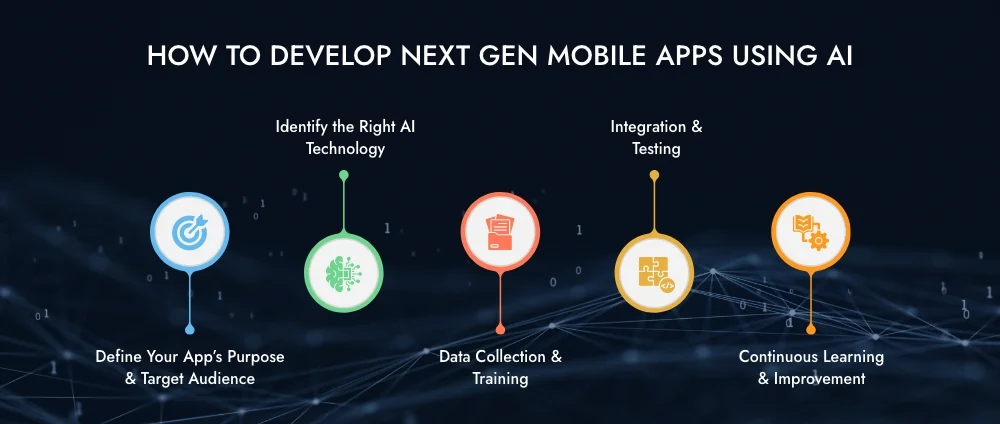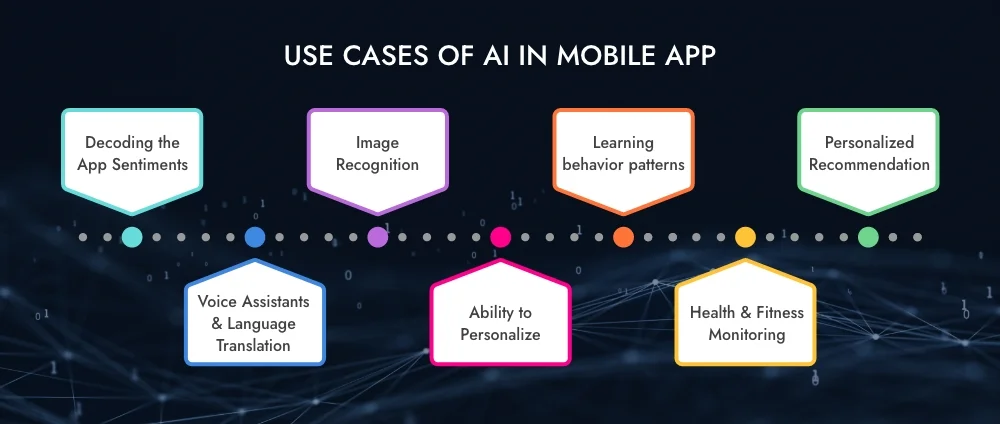AI has made a remarkable journey from the confines of tech giants like IBM and Amazon to becoming an integral part of everyday life, especially through mobile devices. Its influence is profound and far-reaching.
Through AI’s various branches like Machine Learning, Predictive Analysis, and Deep Learning, businesses operating on mobile platforms have achieved unprecedented levels of personalization. This extends not only to the features they offer but also to their marketing strategies. AI has become the driving force behind the evolution of next-gen apps, defining a new standard for enterprises navigating the digital landscape.
Yet, the impact of AI extends beyond these realms.
Why AI in mobile app development is a game-changer
A recent Forbes report highlights that 63% of mobile app developers already use AI in some form. This surge in adoption isn’t surprising when you consider the unique capabilities AI brings to the table:
- Personalization: AI can analyze user data to understand preferences and behavior patterns. This allows apps to deliver hyper-personalized experiences, boosting engagement and satisfaction.
- Predictive analytics: AI can predict user needs and recommend relevant actions or content before they know they need it. This proactive approach leads to a more intuitive and seamless user experience.
- Enhanced security: AI-powered security features can detect and prevent fraudulent activity in real-time, safeguarding user data and protecting against cyber threats.
- Voice and image recognition: AI can power features like voice assistants and image recognition, enabling natural and intuitive interaction with mobile apps.
By using these capabilities, AI opens the way for the development of next gen apps that are:
- More intelligent: They can expect user needs and adapt to individual preferences.
- Highly engaging: They deliver personalized experiences that keep users returning for more.
- Seamless and intuitive: They offer a frictionless user experience with features like voice commands and image recognition.
- Secure and reliable: They use advanced AI-powered security measures to protect user data.
How to develop next gen mobile apps using AI
Allied Industry research predicts that by 2030 the global mobile artificial intelligence (AI) industry will be worth $84.80 billion. So, how to use AI in mobile apps and create an innovative app? Here’s a roadmap to follow:

- Define your app’s purpose and target audience: Clearly articulate the problem your app solves and who it benefits. This will guide your choice of AI functionalities.
- Identify the right AI technology: Depending on your app’s core features, explore various AI options, such as machine learning, natural language processing, or computer vision.
- Data collection and training: Gather high-quality data relevant to your app’s functionalities and use it to train your AI models effectively.
- Integration and testing: Seamlessly integrate the trained AI models into your app and rigorously test their performance to ensure accuracy and reliability.
- Continuous learning and improvement: AI models rely on continuous learning. Implement tools to gather user data and feedback to refine your AI models over time.
Get ready to develop next-gen mobile apps powered by AI?
Use cases of AI in mobile app
AI applications in mobile apps are numerous and constantly increasing. Here are some attractive use cases:

Decoding the app sentiments
AI’s Sentiment Analysis feature monitors conversations about your app on different platforms such as social media, forums, and review sites. It analyzes the language used by users to determine their sentiments, whether positive, negative, or neutral. Tracking these discussions offers valuable insights into user interactions and preferences.
This analysis helps identify trends, patterns, and areas for improvement within the app. For instance, it can highlight frequently mentioned features users appreciate or complaints about certain functionalities. This information is crucial for understanding user satisfaction levels and guiding decisions for future updates and enhancements to the app.
Voice assistants and language translation
Mobile apps commonly use voice assistants like Siri, Google Assistant, and Amazon Alexa. They perform tasks, answer questions, and give recommendations. The voice recognition market is expected to reach $26.79 billion by 2025. Siri, for example, can set reminders, send messages, make calls, and provide info based on voice commands.
Language translation apps use AI to translate between languages in real-time. Google Translate, for instance, offers accurate translations in both written and spoken form.
Image recognition
AI algorithms in mobile apps analyze images from the camera for augmented reality, visual search, and object recognition.
Google Lens employs AI-powered image recognition to identify objects, landmarks, and products, delivering relevant information and search results.
Ability to personalize
AI enables taxi booking apps to send discount messages at the right time and restaurant apps to suggest preferred food items, enhancing user experience. This AI feature grants brands access to user location and device usage data, including active times, preferred apps, social interactions, and visited platforms.
With this information, companies can tailor discounts and cashback offers within the app based on individual preferences and behaviors. AI takes personalization to a new level, reshaping customer relationship management strategies.
Learning behavior patterns
Platforms often use AI to understand users’ buying habits for smoother interactions. For example, Snaptravel, a hotel booking service, uses NLP and machine learning to chat with users naturally. If the chatbots face issues, humans step in to teach them.
AI also helps detect fraud in online payments by analyzing credit card details and purchase history. If a purchase doesn’t match a user’s spending, AI flags it as potentially fraudulent.
Health and fitness monitoring
Mobile apps with AI capabilities collect and analyze user data on physical activities, sleep, nutrition, and vital signs for insights into health and fitness. These apps offer personalized workout routines, nutrition plans, and lifestyle adjustments based on individual data. They monitor health patterns, provide early warnings, and suggest preventive measures.
Tracking user behaviors like exercise consistency, sleep, and nutrition promotes healthy habits. Through reminders, goal tracking, and habit-forming techniques, AI helps users stay accountable and make positive lifestyle changes.
Personalized recommendation
Mobile apps use AI to offer personalized recommendations by analyzing user preferences and behaviors. AI algorithms and data analysis help apps understand individual interests and provide relevant content.
Amazon employs AI to tailor product suggestions based on browsing and purchase history, boosting sales. Spotify uses AI to generate personalized music recommendations by analyzing listening habits and user data. This customization enhances user experience and engagement with the app.
Real-time examples of how to use AI in mobile app
AI has been applied in various real-world circumstances, changing several industries. Some best AI examples are:
- E-commerce apps use AI to provide personalized product suggestions and customer service chatbots. For example, Amazon’s app uses AI to make product recommendations based on user activity.
- Healthcare apps use AI for patient monitoring, diagnosis, and personalized health recommendations. Apps such as Babylon Health use artificial intelligence to provide medical consultations based on a user’s medical history and general knowledge.
- Google Maps and Waze employ artificial intelligence (AI) to analyze traffic data and make real-time travel suggestions.
- Social media apps like Instagram and TikTok use AI to personalize content and increase user engagement through tailored feeds and suggestions.
- Logistics companies leverage AI to optimize supply chain management, route planning, and inventory management. For instance, companies like FedEx employ artificial intelligence algorithms to streamline package delivery routes and reduce shipping costs.
- In Information Technology, AI is used for network security, anomaly detection, and data analysis. Companies like Cisco utilize AI-powered solutions to identify and mitigate cybersecurity threats in real-time, enhancing overall network resilience.
- Within the Public sector, AI is employed for various purposes, such as fraud detection, resource allocation, and citizen services. Government agencies utilize artificial intelligence technologies to detect fraudulent activities in welfare programs and optimize the allocation of public resources for maximum efficiency.
- In Finance, AI is revolutionizing the industry with applications in fraud detection, risk assessment, and automated trading. Financial institutions like JP Morgan Chase utilize AI algorithms to analyze market trends and make data-driven investment decisions, leading to increased profitability and reduced risk exposure.
Next-gen business transformations start from ViitorCloud
The potential of AI in next gen app development is boundless. At ViitorCloud, we’re at the forefront of this transformation, helping businesses utilize AI to create intelligent, engaging, and future-proof mobile apps. Our team of experienced AI developers and mobile app specialists can guide you through every step of the development process, ensuring your AI-powered app is a resounding success.
Ready to use AI’s power and craft a next-generation mobile app? Partner with ViitorCloud and enjoy the transformative power of AI in app development. Contact ViitorCloud today and schedule a consultation to discuss your requirements for AI development services!
Frequently asked questions
The future of AI in app development is inspiring. We can expect even more refined AI models that can learn and adapt at an unexpected pace. This will lead to more personalized, intuitive, and intelligent mobile apps seamlessly integrating with our lives.
AI mobile app development is fundamentally changing the industry by shifting the focus from generic experiences to hyper-personalized ones. AI empowers apps to understand and anticipate user needs, increasing user engagement and satisfaction.
Artificial intelligence-based app development requires machine learning engineers, data scientists, software developers, and other technical experts, depending on the project requirements. Because of these, project costs may vary every time. You can contact our sales team to learn more.
When choosing an AI mobile app development company, consider its experience with AI development, the specific AI technologies it specializes in, and its portfolio of successful AI-powered apps. Finding a company that understands your app’s vision and can guide you through the entire development process.

Vishal Patel
Vishal Patel is an experienced Solution Consultant with a proven track record in the information technology and services industry.
